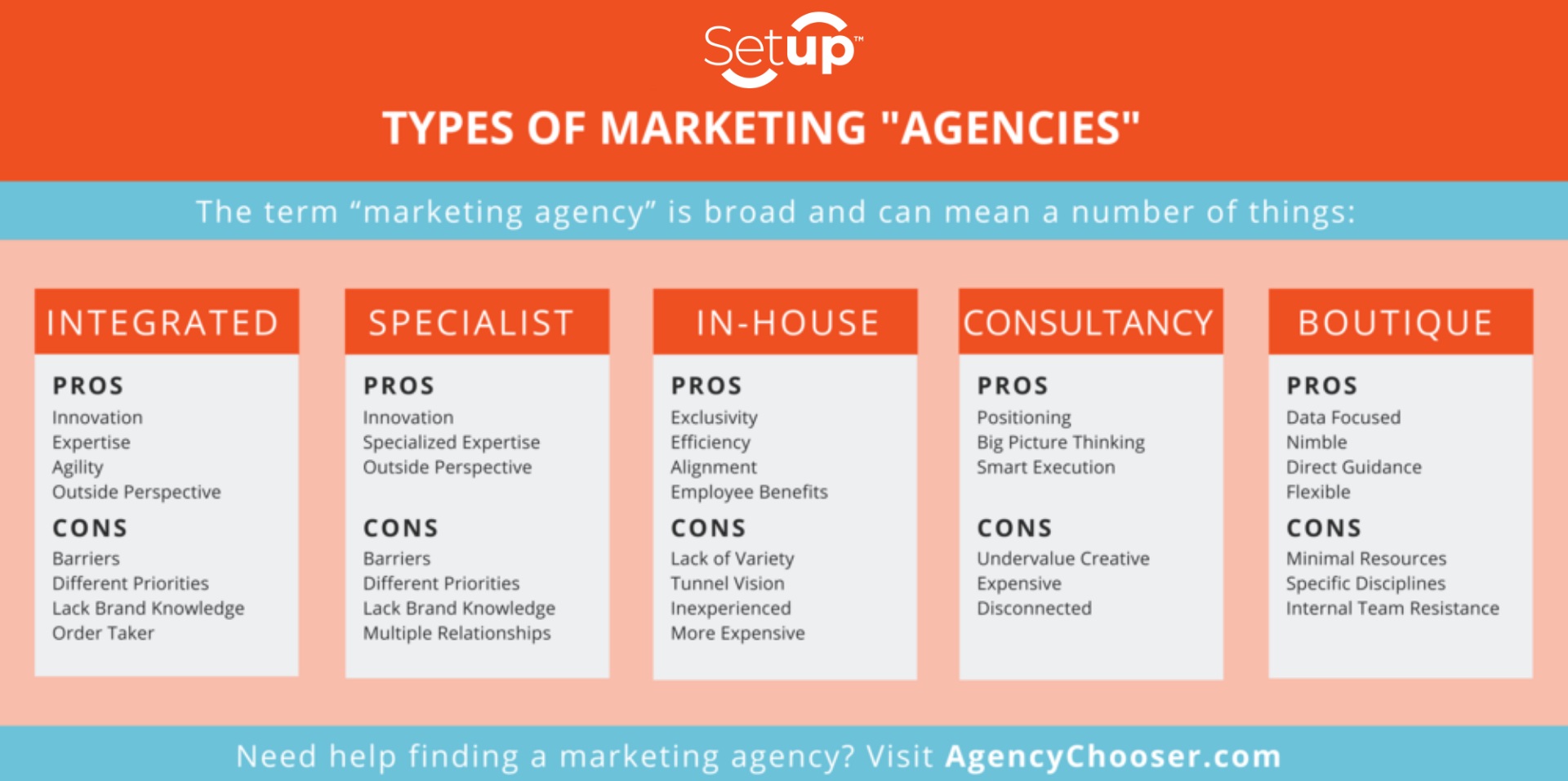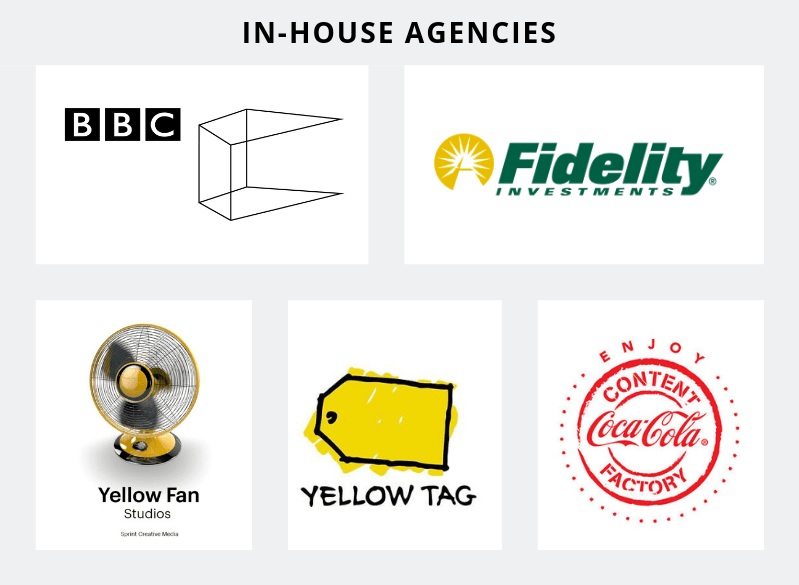The Different Types of Marketing Agencies
There are multiple paths a marketing executive can take when determining who and what will guide a marketing strategy. Choosing a marketing agency partner can depend on a number of variables including team capacity, capability, and situation.
The term “marketing agency” is broad and can mean a number of things:
Integrated Marketing Agency - This is what people typically think of when they use the term “marketing agency.” Integrated marketing agencies help brands fill gaps in capacity or capability. They typically have a variety of capabilities.
Specialist Marketing Agency - Agencies with a highly specialized skill set.
In-house Agency - Brands put together in-house marketing centers-of-excellence which have all of the functions of a typical marketing agency, but the team only works on the single brand.
Consultancy - Large global consultancies like Capgemini, Deloitte, IBM, Accenture, PwC, etc. have always provided businesses with operational insights, but now are also offering marketing insights and execution.
Boutique Consultancy and Individual Marketing Consultants - Small consultancy firms or consultants are great for teams with limited budgets, teams that need help with strategy, or teams that want the nimble and personal touch of one or a few marketing consultants that specialize in a specific area.
Just like dating, when it comes to marketing agencies, there are plenty of fish in the sea - each with its own pros and cons. The right choice comes down to compatibility, need, and budget.
Integrated Marketing Agency
Companies typically consider hiring an integrated marketing firm or advertising agency if their team lacks capacity or resources for a given project.
Pros of an Integrated Marketing Agency Model
Innovation - Integrated marketing agencies can bring cutting edge technology and innovative ideas to the table.
Expertise - Experienced staff armed with insights/learnings from past clients.
Agility - Resources that can scale up and down depending on the brand’s needs.
Outside Perspective - Since the agency is not directly associated with the brand, they have an advantageous perspective.
Cons of an Integrated Marketing Agency Model
Barriers - Communication barriers and multiple approval processes can slow down timelines or lead to inefficiencies.
Different Priorities - Workers’ attention is split because they are juggling multiple clients.
Lack of Brand Knowledge - The agency needs an adjustment period to take the time to understand and become familiar with the client’s business model.
Don’t Always Drive Strategy - Sometimes integrated agencies can fall into the role of “order taker,” meaning they fail to take a consultative approach to the brand’s strategy, instead focusing exclusively on the execution or surface-level ask.
Specialist Marketing Agencies
Because the definition of marketing keeps expanding, few corporate marketing teams have expertise in every marketing discipline (like email automation, social media, mobile, digital marketing, public relations, creative, search engine optimization, marketing analytics, etc.). That is why specialist marketing agencies are essential.
Pros of a Specialist Marketing Agency Model
Innovation - Specialist marketing agencies know their craft so well that it is easy to innovate.
Specialized Expertise - Deep experience in one or a few areas of marketing.
Outside Perspective - Since the agency is not directly associated with the brand, they have an advantageous perspective.
Cons of a Specialist Marketing Agency Model
Barriers - Communication barriers and multiple approval processes can slow down timelines or lead to inefficiencies.
Different Priorities - Workers’ attention is split because they are juggling multiple clients.
Lack of Brand Knowledge - The agency needs an adjustment period to take the time to understand and become familiar with the client’s business model.
Multiple Relationships - Brands who hire specialists for each area of need in their marketing department will be faced with managing more agency relationships.
If you’re a brand who thinks an integrated or specialist marketing agency will best fit your marketing efforts, we have a free agency guide that will help you find, select, and onboard a new marketing agency.
In-house Agencies
In-house agencies are similar to full-service marketing agencies, in that they have teams with Creative Directors, Art Directors, Copywriters, etc. However, with an in-house agency, the staff is assembled to work exclusively for one client.
This is both a pro and a con because agency-minded people typically like the challenge of working on multiple accounts. Though, with only one client to focus on, in-house team members can dive deeper into exploring their brand’s strategy.
Pros of an In-house Marketing Agency Model
Exclusivity - There is one client which means no pitching so all focus is on the brand.
Efficiency - The approval process may be quicker with faster turnaround times because the team is working internally.
Alignment - There is more control of proceedings and easier communication when the advertising and marketing is all under one roof - this makes marketers feel like there is more transparency.
Brand Understanding - Team members have a deeper understanding of the brand values and beliefs, making it easier to incorporate them into the strategy and become the architect of the brand’s marketing future.
Employee Benefits - In-house employees are backed by corporations with large purchasing power so benefits and salary are probably better. Also, because there is only one client, employees typically have a more manageable work-life balance compared to traditional marketing agencies.
Cons of an In-house Marketing Agency Model
Lack of Variation - No excitement or diversity in work for employees.
Tunnel Vision - A scarce outside perspective can result in tunnel vision and troublesome or insensitive campaigns.
Inexperienced - Team members lack the industry experience and subject matter expertise to professionally handle multiple media platforms.
More expensive - It requires a substantial investment in onboarding/training to create an in-house agency.
Global consultancies
Global consultancy firms have historically been focused on mapping business strategy… but lately, consultancies like Deloitte are shifting their offerings and offering execution as part of their services. This blurs the line between integrated marketing agencies and consultancies.
Because traditional marketing agencies are generally known for pursuing creative work and large consultancies for strategy, the fact that consulting firms are making the shift to offering both strategy and execution is giving them a competitive edge.
In fact, according to a survey by Forrester, “73% of marketers are open to using consultancies for digital marketing work.”
Pros of a GLOBAL Marketing Consultancy Model
Positioning - Because of where large consulting firms are positioned, consultancies enter companies through the board or CEO relationship. This makes for an easy and resistant-free relationship where the internal team and consultancy are working together.
Big Picture Thinking with Smart Execution - Consultancies have always looked at how strategies impact the business as a whole. Now, they can plan and execute the strategy, while staying aware of all of the moving parts of a business.
Cons of a GLOBAL Marketing Consultancy Model
Undervalue Creative Talent - Consultancies typically undervalue innovation, creative work, and content marketing.
Expensive - The easily-established relationship between the brand executives and consultancy leaders make the consultancy work appear cost beneficial, but consulting services are not cheap.
Disconnected - Big consultancies like Deloitte and Capgemini are acquiring agencies to supply further services to clients and add more disciplines to their repertoire. Even though large consulting firms are acquiring the agencies needed to check all the boxes, it is difficult to Frankenstein a constructive beast out of different agencies with different philosophies, values, and operations.
Boutique Consultancies & Individual Marketing Consultants
Like integrated agencies, smaller boutique consultancies or individual consultants come in two forms: specialist or generalist. Specialist consultancies can help map the strategy for a specific discipline (like email or social media) and generalist firms can help formulate an overall business plan.
Unlike a large consultancy firm, boutique consultancies may lack the resources to provide multiple services, revenue to acquire agencies to cover multiple disciplines, and prestige/credit to enter a corporation through the C-suite. A boutique consultancy firm, however, provides businesses with direct feedback, direction, guidance, and a specialized opinion on a specific problem or issue.
Boutique consultancies may act as a preferred partner for some projects because they are nimble and flexible. If anything, boutiques are another resource for clients to seek strategy consulting. Since consultancies have a tendency to look at the big picture, a client may hire a big or small consultancy to take into account all of the moving parts of their business.
The rapid growth and evolution of marketing has blurred the lines of different “agency” types. With any agency relationship, it is important to set up a process of clear expectations like a communication cadence with regular check-ins to ensure deliverables are met, assign a day-to-day resource/staff member who will manage the partnership, and schedule reviews to evaluate the marketing plan and business strategy regularly.
More agency relationship resources:
The Complete Guide to Finding a Marketing Agency - This free guide walks clients through finding, selecting, and onboarding a new agency partner.
Agency Scorecard - Clients can use this scorecard on a regular basis to ensure that their agency partners are delivering on expectations. There is also a version that can be used during a pitch process to evaluate potential agency partners.
Marketing Brief Template - This guide offers marketers a comprehensive marketing brief template designed to keep a marketing team on the same wavelength.
Marketing Budget Template - Don’t lose track of what matters. This budget template helps clients prioritize their spending for the year.
See more free resources at our Resources Center.













Just like how a marching band has multiple sections to sound good, a marketing agency has multiple departments to function properly. Navigating the different roles and purposes of each department can get confusing and overwhelming, however.
Here is a simple breakdown of some typical agency departments (and the roles within) for those interested in working in/for a marketing or advertising agency.